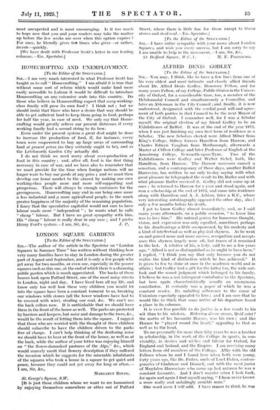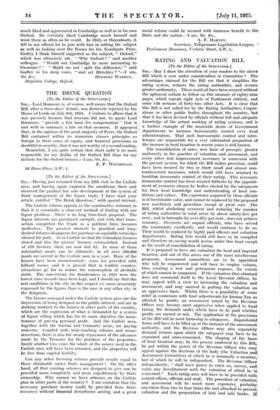ALFRED DENIS GODLEY
[To the Editor of the SPECTATOR.] SIR,–You may, I think, like to have a few lines from one of his very oldest and most intimate and closely allied friends about Dr. Alfred Denis Godley, Honorary Fellow, and for many years Fellow, of my College, Public Orator in the Univer- sity of Oxford, for a considerable time, too, a Member of the Hebdomadal Council and simultaneously a Councillor, and later an Alderman in the City Council ; and, finally, it is now understood, designated with the cordial good will and agree- ment of both parties in that Council to be the next Mayor of the City of Oxford. I remember well, for I was a Scholar myself, the original election of my friend Godley to be an Exhibitioner of Balliol. It was at the end of the year 1872, when I was just finishing my own first term of residence as a Scholar. The new Scholars elected were Alfred Milner from King's College, Sidney Graves Hamilton from Harrow, and Charles Edwyn Vaughan from Marlborough, afterwards a Master at Clifton College and later Professor of English at the
Armstrong College, Newcastle-upon-Tyne. Two of the Exhibitioners were Godley and Walter Sichel, both, like Hamilton, from Harrow. The Harrow successes caused a sensation, and a contemporary of those days, another Balliol Harrovian, has written to me only to-day saying with what great pleasure he telegraphed the result to Dr. Butler and with what pleasure Butler received it. Godley did not come up at once ; he returned to Harrow for a year and stood again, and won a scholarship at the end of 1873, and came into residence along with Hamilton and A. J. Ashton, later a K.C., whose very interesting autobiography appeared the other day, alas I only a few months before his death.
I got to know Godley almost immediately, and, as I said many years afterwards, on a public occasion, " to know him was to love him." His natural genius for humorous thought, vision, and expression was only equalled, sometimes perhaps to his disadvantage .a little overpowered, by his modesty and a kind of intellectual as well as physical shyness. As lie went on and gained more and more success, recognition and accept- ance this shyness largely wore off, but traces of it remained to the last. A relative of his, a lady, said to me a few years ago, " Alfred is not as distinguished as lie ought to have been." I replied, " I think you say that only because you do not realize the kind of distinction which he has achieved." It is given to few to shine at once in the academic world and in affairs ; but Godley had a gift for the latter too, the wide out- look and the sound judgment which belonged to his family. I believe he was a not infrequent contributor to the Spectator, but here again chaMeteristically usually an anonymous contributor. It certainly was a paper of which he was a constant reader. Its unfailing adherence to the cause of Unionism especially appealed to him ; and I am sure that he would like to think that some notice of his departure found a place in its columns.
It is even less possible to do justice in a few words to his wit than to his wisdom. Bidenlon dicere vertu% Quid eclat? the motto of his favourite Horace, was his own ; and like Horace he " played round the heart," appealing to that as well as to the head.
To me personally for more than filly years be was a brother in scholarship, in the work of the College, in sports, in con- viviality, in desires and wishes and labour for Oxford, for England and Ireland, and the Empire. I am receiving many letters from old members of the College. Alike with the old Fellows whom he and I found here when both were young, forty years ago, like Dr. Fisher, uncle of Lord Fisher, contem- poraries of Gladstone and Disraeli, and with the most junior of Magdalen Harrovians who came up last autumn he was a constant favourite. And I don't wonder when I look back, for again and again I find myself saying, " I haw never known a more really and unfailingly amiable man."
One word more I will add. I have reason to think he Wag
much liked and appreciated in Cambridge as well as in his own Oxford. He certainly liked Cambridge much himself and went there as often as he could. In 1913, or thereabouts, it fell to my official lot to join with him in setting the subject as well as looking over the Poems for the Newdigate Prize. Godley I think himself suggested as the subject, " Oxford," which was ultimately set. " Why Oxford ? " said another colleague. " Would not Cambridge be more interesting to Oxonians ? " " Might we not ' split the difference,' " said Godley in his deep voice, " and set Bletchley ? "—I am,



























































 Previous page
Previous page